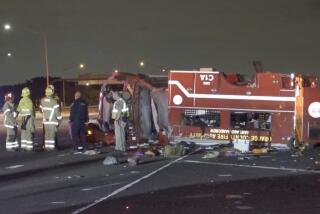DNA backlog grows with LAPD lab hiring on hold
Faced with an unrelenting fiscal crisis, Los Angeles city officials have refused to hire needed analysts for the Los Angeles Police Department’s crime laboratory, hampering a plan to eliminate a backlog of untested DNA evidence from rape cases and angering victims’ rights advocates.
Last spring, despite a near freeze on all city hiring, the City Council set aside $1.4 million to hire 26 staffers for the LAPD lab and cover their salaries for about six months.
The proposed hires were part of a three-year plan that Mayor Antonio Villaraigosa and other officials unveiled in 2008, vowing at the time that it would remedy the chronic staffing shortfalls in the lab that had led to a massive backup of evidence.
Sixteen people were hired when the plan was announced, but 36 more were needed before the lab would be capable of handling the constant demands for testing of evidence, police officials said. Until sufficient staffing levels were met, the lab would not be able to keep pace with the workload and the backlog would persist, they said. Despite the council’s allocation for 26 new hires, the police lab was stymied repeatedly as police officials sought the funds and permission needed from the City Hall bureaucracy to begin the hiring.
In recent weeks, a panel of city officials that must approve hiring during the ongoing fiscal emergency notified the LAPD that its request had been rejected, seemingly quashing hope that the hires might still be made.
Villaraigosa, who has a representative on the hiring panel, ultimately went along with the decision. Matt Szabo, the mayor’s deputy chief of staff, said the city could not afford the long-term costs of adding extra employees to the city payroll.
“The mayor was trying to figure out a way to accomplish the goal cheaper and faster without adding to the city’s fiscal crisis by hiring employees we cannot afford,” Szabo said.
Instead, Villaraigosa said he supports a compromise that City Council President Eric Garcetti introduced Friday that calls for about a quarter of the earmarked money to be spent on turning over untested pieces of DNA evidence to private labs for processing.
For months, the LAPD has been aggressively shipping the backlogged DNA samples to private labs. Funds for that effort, however, have all but run dry. The money proposed under Garcetti’s plan would be enough to resume that process for about two months.
City Controller Wendy Greuel, who was a member of the City Council when the allocation was made, called the decision to abandon the hiring plan “outrageous and unacceptable.” She urged the council and the mayor to allow at least some of the hires.
The city’s backtracking was met with deep disappointment and anger from Sarah Tofte, a researcher for Human Rights Watch who has worked closely with LAPD officials to remedy the backlog problem and drawn attention to the issue in law enforcement agencies around the country.
“If they ignore the long-term need of building up their own lab’s capacity, they will never be able to permanently eliminate the backlog and they will continue to deny real-world justice to rape victims,” Tofte said. “They have a solution within their reach and they’re finding a way to undermine it. They’re sending a clear message that the city is going to try to find justice for rape victims on the cheap. You can’t do that. It won’t work.”
Unexamined evidence holds potentially crucial information. Analysts can extract a person’s genetic code from collected samples of blood, semen or other genetic material and compare it with those of known felons in federal and state databases. When a DNA sample collected at a crime scene or from a victim’s body is matched to a DNA profile of someone in the database, it can offer prosecutors nearly irrefutable proof of the person’s guilt or innocence. The evidence also can be used to confirm that someone has not falsely confessed to a crime or link someone to other unsolved cases. A November audit by Greuel of the DNA backlog highlighted the need for adding new analysts. Among its findings, the audit found that the LAPD lab’s depleted staff was unable to keep up with evidence as it is returned from private labs.
Federal law mandates that LAPD analysts must upload the DNA profiles into state databases for comparison with those of felons. At the time of the audit, 1,100 pieces of evidence were waiting to be uploaded. That number has since grown to more than 1,700, said Yvette Sanchez-Owens, who oversees the LAPD lab.
“This is a direct threat to public safety,” said Gail Abarbanel, director of the Rape Treatment Center at Santa Monica-UCLA Medical Center. “It means leaving rapists on the streets of our city.”
Through using private labs, the LAPD has made significant progress on its backlog that once stood at roughly 7,500 cases. Currently, evidence from 1,318 cases remains untested, Sanchez-Owens said. Those remaining cases either have been solved or closed by prosecutors who found them too weak to pursue.
Compounding the problem, however, is the LAPD lab’s inability to keep up with new cases that require testing. Currently, evidence from 821 such cases awaits testing, Sanchez-Owens said.
LAPD Chief Charlie Beck remained in step with Villaraigosa, his boss, saying the decision not to hire additional analysts was understandable in light of the city’s dire financial condition.
He expressed hope that the council would approve Garcetti’s compromise plan, saying “it would give the city some flexibility in the short term.”
“I’m a realist,” he said.
More to Read
Sign up for Essential California
The most important California stories and recommendations in your inbox every morning.
You may occasionally receive promotional content from the Los Angeles Times.











